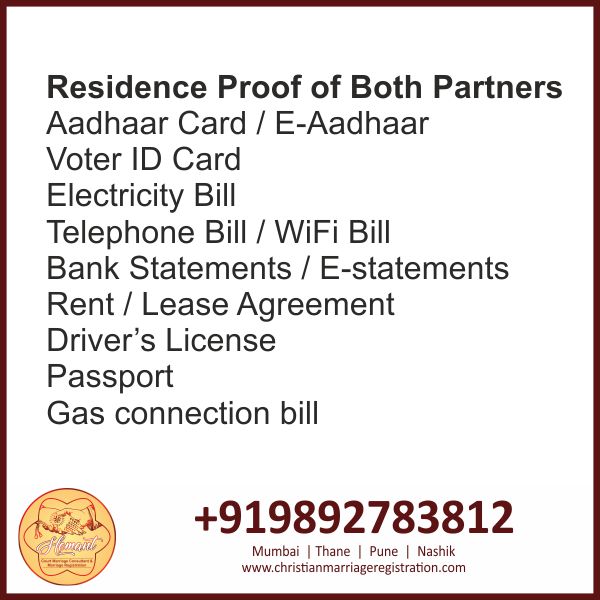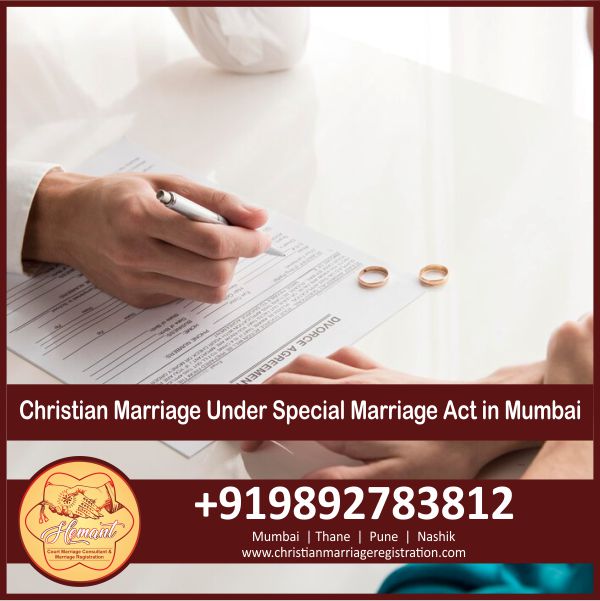Christian marriages in India can be registered under two primary legal frameworks: the Indian Christian Marriage Act, 1872, and the Special Marriage Act, 1954. While the Indian Christian Marriage Act specifically governs marriages between Christians, the Special Marriage Act provides a secular framework for marriages between individuals of different religions or those who prefer a civil marriage. This act is particularly beneficial for interfaith Christian couples or those who wish to avoid religious rites. The Special Marriage Act offers legal validity across India and ensures equal rights and protections under the law, making it an attractive option for couples seeking a more inclusive and streamlined registration process.
The Special Marriage Act, 1954, is an Act of the Parliament of India that allows for secular civil marriages, providing a legal framework for interfaith and non-religious weddings. It is especially useful for Christian couples who may not wish to follow traditional church wedding rituals or for those in interfaith relationships. By choosing the Special Marriage Act, couples can ensure a legally valid marriage recognized across India, without the need for a church ceremony.
Why Choose Special Marriage Act for Christian Marriage?
- Legal Validity Across India: The Special Marriage Act provides a marriage certificate that is legally recognized throughout India, ensuring that couples have a valid marriage document for all administrative and legal purposes.
- Ideal for Interfaith and Non-Religious Christian Weddings: This act is particularly beneficial for interfaith marriages, as it allows couples from different religious backgrounds to marry without converting to each other’s religion. It also accommodates non-religious Christian weddings, providing a civil marriage option.
- No Requirement for a Church Wedding or Religious Rites: Unlike the Indian Christian Marriage Act, which typically involves a church ceremony, the Special Marriage Act does not require any religious rites, making it a more secular choice.
- Equal Rights and Protections Under the Law: Couples married under this act enjoy equal rights and protections, including those related to divorce, inheritance, and maintenance, which are governed by the provisions of the Special Marriage Act itself.
For more information on the Special Marriage Act, you can visit the Indian Government’s Official Portal or refer to the Wikipedia page on the Special Marriage Act, 1954.
Eligibility Criteria for Christian Marriage Under SMA
Couples may face several challenges during the registration process, including parental objections, social pressure, document issues, and delays in registration. However, the Special Marriage Act provides legal rights and protection against such challenges. For document issues, couples can seek legal assistance to rectify errors and expedite the process.
Advantages of Christian Marriage Under SMA vs. Christian Marriage Act
Marriages under the Special Marriage Act offer several advantages over those registered under the Indian Christian Marriage Act:
- No Requirement for Church Wedding Rituals: Couples can avoid traditional church ceremonies.
- More Streamlined Registration Process: The process is often more straightforward and less complex.
- Provides a Secular and Legally Binding Marriage: Ensures equal treatment under the law.
- Equal Treatment in Matters of Divorce and Inheritance: Couples enjoy equal rights in legal matters.
Get Your Marriage Registered Today!
Fill the below form for enquiry.
Step-by-Step Registration Process
Registering a Christian marriage under the Special Marriage Act, 1954, involves several key steps. This process is particularly relevant for interfaith marriages or those who prefer a civil marriage. Here’s a detailed guide on how to register your marriage:

Submission of Notice of Intended Marriage
- Where to Submit: The notice must be submitted at the Marriage Registrar’s office in the district where at least one of the partners resides.
- What to Include: The notice should include details such as names, ages, addresses, and marital status of both partners.
- Purpose: This notice is a public declaration of the intention to marry, allowing for any objections to be raised.

30-Day Waiting Period for Objections
- Duration: After submitting the notice, there is a mandatory 30-day waiting period.
- Purpose: This period allows for any objections to the marriage to be raised. If no objections are received, the marriage can proceed.
- What to Expect: During this time, the notice is displayed publicly, and anyone can raise objections if they believe there are valid reasons to prevent the marriage.

Verification of Documents and Witnesses
- Required Documents: Couples must provide identity proof, age proof, residence proof, and a declaration of marital status.
- Witnesses: Two witnesses are required to attest to the marriage. They must provide their identity proofs as well.
- Verification Process: The Marriage Registrar verifies all documents and witnesses to ensure compliance with the Special Marriage Act.

Solemnization of Marriage Before a Marriage Officer
- Where to Solemnize: The marriage must be solemnized before a Marriage Officer appointed under the Special Marriage Act.
- Ceremony Details: The ceremony can be conducted in a simple manner without any religious rites. The couple and their witnesses must be present.
- Legal Recognition: This step provides legal recognition of the marriage under Indian law.

Issuance of Marriage Certificate
- After Solemnization: Once the marriage is solemnized, the Marriage Officer issues a marriage certificate.
- Legal Validity: This certificate is legally valid across India and recognized for all administrative and legal purposes.
- Importance: The certificate serves as proof of marriage and is essential for various legal and administrative tasks.
Documents Required
To register a marriage under the Special Marriage Act, couples need to submit the following documents:

Birth Certificates or Age Proof

Baptism Certificate

Residence Proof of Both Partners

Passport-Sized Photographs

Wedding Invitation Card

Affidavit Confirming Marital Status
Special Circumstances Documentation:
- Previous marriage: Divorce decree or death certificate of former spouse
- Foreign nationals: Valid visas, residence permits, or apostilled documents
- Age verification: Birth certificates or school leaving certificates (if required)
Why Choose Hemant Enterprises?
With over sixteen years of specialized experience in marriage registration services, Hemant Enterprises brings unparalleled expertise to Christian couples seeking marriage registration in Mumbai. Their deep understanding of the Indian Christian Marriage Act and its application within local jurisdictions ensures accurate compliance with all legal requirements. This expertise translates into efficient handling of documentation, anticipation of potential issues, and smooth navigation through administrative processes that might otherwise prove challenging for couples unfamiliar with legal procedures.
The company prioritizes processing efficiency without compromising legal accuracy, employing streamlined workflows that minimize bureaucratic delays while maintaining full compliance with marriage registration regulations. Their established relationships with registration authorities facilitate smoother communication and processing, significantly reducing the time couples must wait for certificate issuance. This balance of speed and accuracy proves particularly valuable for couples facing time-sensitive situations such as visa applications or name change requirements.
EXCELLENTTrustindex verifies that the original source of the review is Google. Very good service. I stay outside India and had a short while in Mumbai in which I needed the process completed. Hemantji ensured a quick and seamless process as his team took the lead, sorting out all the requirements. He is also quite prompt with his replies to any queries. Would recommend.Trustindex verifies that the original source of the review is Google. It was a good experience. The agent was very good in communication and reverted all our queries. We asked the agent to visit our place for the formalities where he made all the procedures smooth and quick.Trustindex verifies that the original source of the review is Google. "I am truly impressed with your exceptional service! Your speed and efficiency in handling everything, from the arrangements to the instant certification, made the entire process seamless and stress-free. Your professionalism and dedication are remarkable, and I sincerely appreciate your outstanding work. Thank you for making everything so quick and effortless!"Trustindex verifies that the original source of the review is Google. He is so much cooperative and cost is very reasonable for anyone.Trustindex verifies that the original source of the review is Google. HEMANT JI HELPED US A LOT . IT WAS HASSEL FREE , WORK AND REGISTRATION COMPLETED IN LESS THAN 30 MINS. THANK YOU 😊Trustindex verifies that the original source of the review is Google. The whole process was very seamless and hassle free. Hemant was very helpful throughout the process. Would recommend Hemant for any Marriage registration related servicesTrustindex verifies that the original source of the review is Google. We recently registered our marriage in Mumbai with the help of Mr. Hemant. He gave a lot of clarity with respect to the process and was very responsive. The entire process was seamless and I would definitely recommend him.Trustindex verifies that the original source of the review is Google. Very good services and on time. Whole process for registration was conducted very smoothly.👍🏼
Trusted by over 10000 Clients in all over Maharashtra and India. Since 2006.
- 16+ Years of Experience
- Expert Legal Guidance
- Multiple Branches
- Hassle-Free Document Processing
Frequently Asked Questions.
No, a church marriage is not automatically legally valid. Couples must register their marriage with the Marriage Registrar.
Typically takes 7–10 working days, but express services can expedite this to 48 hours.
Yes, you can register your marriage at any time after the ceremony.
- Seek legal advice or contact another church for assistance.
- Costs vary depending on the service provider and type of registration (standard or express).
Get Your Marriage Registered Today!
Fill the below form for enquiry.








